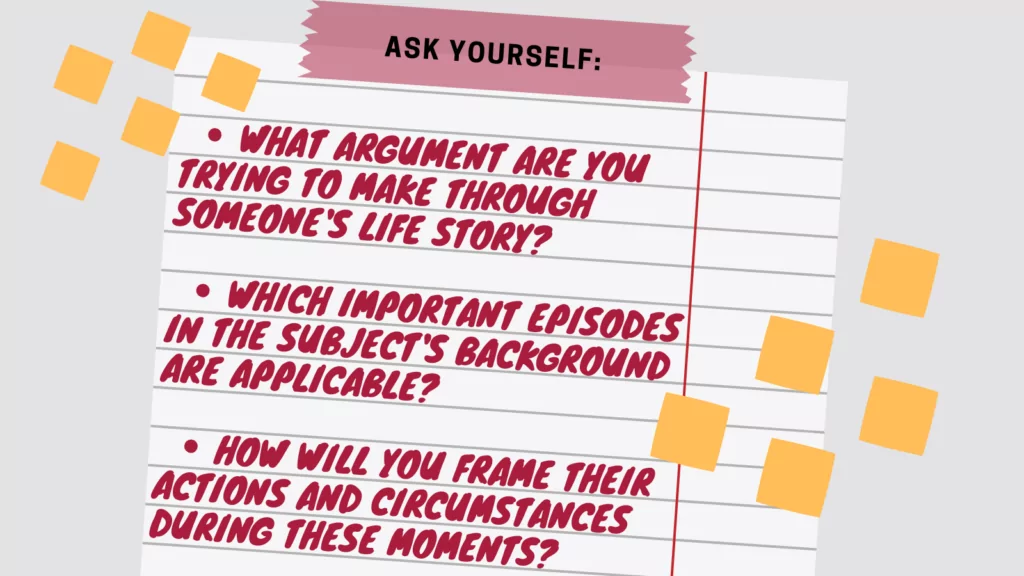What comes to mind first when you hear the word “biography”? Probably a famous scientist or some other long-dead guy. But the truth is, all these people lived fascinating lives worth documenting, because they had a story to tell. Well, what do you know: so do most people, including you! You can write a captivating biography about anyone.
There are captivating biographical books written by and about child stars who came to fame young and struggled with mental health because of it. Regular guys who decided to abandon civilization and live in the wild. People with unconventional families. You just have to know how to approach it and you, too, can uncover a hidden gem in someone’s life. Knowing the basics of biographical writing is a useful skill to master during your academic career. It can boost your professional development. An essay is a great place to start. Let’s define the main characteristics of a biography essay and make it effective together.
What Is a Biography Essay?
A biography, or a bio, is a recorded story of a person’s life. A regular biography is written from an outsider’s perspective, though the process might involve collaboration from the subject in some form (like interviews or primary source documents). An autobiography is written by its subject. A biographical essay is a piece of writing about someone’s life that simultaneously presents the author’s arguments.
There is a difference between a bio and a CV, or curriculum vitae (lat. “course of one’s life”). CV lays out the dry facts about a person in chronological order. It has to convey bare-bones information quickly; for example, from a job candidate to a recruiter. The unique feature of biographical writing is investigating someone’s life path. It has to provide insights into possible causes and effects of the subject’s choices and integrate them into a larger picture. The focus, however, doesn’t shift away from the person. A form of autobiographical writing is a memoir. Unlike a proper biography, which is an overview of someone’s life as a whole (up to death, or a recent point if the subject is alive), a memoir only covers a particular event or a narrow period, so you don’t want to mix them up!
Though an overarching genre in their own right, biographies can tell stories in different subgenres, depending on the writer’s goals and the angle of attack. Many historical figures have multiple biographies written about them, which vary significantly in tone and takeaways. Biography essay examples for college admission lead readers through the life factors influencing someone’s academic career and forming their future professional goals. But if you were drafting up a bio for, say, participation on MasterChef, other (read: culinary) factors in your life would be more relevant to highlight.

How To Write a Biography Essay
Now, then: what should be included in a biography essay? Where to start?
Research
First and foremost, a thorough research is required. Look up the existing examples of biographical essays and analyze them. Which parts stand out to you and why? What aspects would you like to include in your work? Look into the feedback. What have other readers marked as effective? The answers will form a solid idea of what to look for. Books and articles are the bedrock of every research journey but don’t forget the multimedia sources: documentaries, movies, exhibitions, video essays, and blogs, which can all provide meaningful insights. Gather all the relevant materials and organize them into a rough narrative structure.
Construct a thesis statement
Every good essay has a logical argument. It should justify discussion and be specific rather than present vague ideas. What argument are you trying to make through someone’s life story? Which important episodes in the subject’s background are applicable, and how will you frame their actions and circumstances during these moments? Formulate the answers clearly before starting work, as it should guide your writing process the entire time. Explain the main ideas you’ll be including in the biography. You can draft a text summary immediately for further structure or add it after the work is finished. A good thesis is short and sweet, just a couple of sentences. It should echo throughout the essay, especially the conclusion. The body of your essay should support your thesis statement.
Structure and outline
With the information you’ve gathered and your thesis statement ready, your biography essay outline practically writes itself. Of course, every essay should have an introduction, a body, and a conclusion. Arrange the gathered biographical facts on a timeline that will support your argument comprehensively within the body text. A structured format specific to biographies includes sections like early life, education, main achievements, personal life, death, if applicable, legacy and societal impact, and even portrayals in popular culture. You should structurally separate each section into paragraphs and use connective words for an easy and smooth reading experience. Keep your sentences concise and specific to avoid sweeping statements. The rule of thumb is to include one idea per sentence and one theme per paragraph. Flesh out your main points. Kill your darlings: remove things that don’t support your core argument.
Stay authentic
When writing autobiographical material, do not change your voice to fit a preset public perception of a famous person or an unrealistic vision of yourself. Having a narrative structure is good, but readers will always appreciate authentic weaknesses more than fictional strengths. There’s space for vulnerability in facts; open communication will help you establish a stronger connection with your audience. Conversely, lies and untrue statements can be glaringly obvious and won’t withstand witness testimony and fact checks. Unlike a CV, a biography or autobiography assumes a certain amount of subjective analysis is involved. Do not, however, confuse this with a free pass for judgment.
Support your arguments and cite your sources
Part of why research is so important is compiling a list or even a database of reputable and relevant sources to cite throughout your essay. The reader must know that your arguments and conclusions were based on facts, not imagination or speculation. Support your statements with direct quotes, checked facts, and linked sources. The sources should be presented as a bibliography at the end of your essay. There are many systems of source formatting. The person or organization assigning your essay usually provides the ones you’ll need for your source list.
Analysis and conclusions
Every essay wraps up in a conclusion, and a biographical one is no different. Here, a summary of the subject’s life story and the author’s core argument should stand beside the final analysis. What is the current impact of the subject’s actions, and what is the modern perception of them? Echo your thesis statement and provide some personal thoughts on the work. What lessons or new information did you learn while writing it? What does it mean to you, personally? What do you hope to leave the reader with? Form your answers and build the conclusion based on them.
Conduct a revision
Once the text is finished, it should still be considered a draft — a final one, yes, but still a draft. The next step is to proofread and edit. Fix any grammatical or spelling errors and watch out for logical inconsistencies. Anything that disrupts your core ideas or thesis statement has to go. Trim any flowery language. Some personal anecdotes are fine to keep for authentic style and flavor, but they should complement your argument instead of taking attention away from it. Fill any gaps in the narrative where it might have clumsily jumped from one point to another. You may ask another person for feedback and make some structural changes based on their takeaways, but do not disrupt the entire work. Instead, make the best of what you have already built. Remember, complete is better than perfect.
How To Write a Biography About Someone Else
The main elements of a biography and an autobiography are the same. However, there are nuances to pay attention to when writing about someone else. Our AI Essay Writer can help, but you need to follow certain principles.
Pick an interesting subject
Select a person whose background and achievements will best suit your core argument and help deliver the ideas you want to convey. Look beyond historical figures and celebrities. There are lesser-known fascinating figures out there! Some personal stories can be discovered via word of mouth, perhaps even in your close circles. Ask your family members to share. Visit forums and social media discussions like Reddit threads. If you have an assigned subject, analyze which aspects of their life are most discussed and try to take a different stance or find a new approach. If you are working within a specific field, look into its lesser-discussed individuals or unsung heroes. However, double-check to ensure there’s enough material and sources to proceed with the research.
Be objective and respectful
There is a difference between summarizing fact-based conclusions of someone’s actions and passing moral judgment. When writing about a person’s life, approach it critically. Avoid generalizations. You are not drafting a eulogy, right? Don’t assign moral value markers like “good/bad” or “cruel/kind”. Evaluating statements should be reserved for analysis of facts and events when said facts and events support the evaluation.
For example: “He made bad decisions” is a weak statement. Compare to: “The policies he implemented led to a drop in median income within the marginalized communities and caused the life quality and expectancy to decrease by 25%.”
Such a sentence is factual when backed up by proper sources and invites an objective evaluation of concrete actions and their consequences. Study your subject with interest and empathy, and let their story form your opinion.
Contextualize your findings
People don’t exist in a vacuum. Environmental factors influence most choices every human makes. That includes historical, economic, social, and geographical aspects. You must explain any relevant events that led to (and resulted from) someone’s existence. This will provide additional insight to the reader and help them understand your subject’s actions and decisions better. Remember: in some cases, all the facts are unknown. They may be lost to time or are yet to be discovered. It’s okay to make an educated guess based on available facts, but avoid filling the gaps with your imagination.
Make sure to mention how others’ perceptions of your subject evolved, especially before and after death, if applicable. This includes overall public reception, opinions of contemporaries and colleagues, and any critical literature. Try to maintain a fair balance between praise and criticism.
So, you see: with a methodological approach and some honest interest it is possible to capture the essence of a person’s life. Someone already known. Someone seemingly ordinary. Your own. Remember, everyone has a story to tell, you just have to put in a bit of time and work to get the audience to open their ears.

FAQ
How to write a biographical essay?
Select an interesting subject whose societal impact is important to discuss. Pick good examples to study and follow. Conduct thorough research and gather relevant material from primary and secondary sources. Form a thesis statement and create an essay outline. Structure your body text according to the subject’s life story. Support your arguments with quotes and references. Echo your thesis statement in the conclusion.
How do you introduce a biographical essay?
Make a brief overview of the subject’s achievements and surrounding historical context. Provide a specific thesis statement on why this warrants discussion and what the text’s core arguments and ideas are.
What is biographical format?
A biographical text tells a subject’s life story, contextualizing it in history without losing focus or passing judgment. It goes beyond simply listing the facts of someone’s existence in chronological order or covering it only partially. A biography should have a narrative structure and insights into the subject’s decisions and circumstances.
What is an example of a biographical writing?
Biographical writing can be literary (books), academic (essays, college application autobiographies), and business-related (CV). It can be written about another person or the author (autobiography). A form of autobiographical writing is a memoir, which covers a particular segment of someone’s life instead of the whole. Biographies can be written about public figures who influenced history, private people who lived through a significant historical event, or individuals who achieved a remarkable fit or were met with a challenging experience. Here are some popular and important biographical books:
- Lives of the Noble Greeks and Romans by Plutarch
- John Adams by David McCullough
- Steve Jobs by Walter Isaacson
- The Diary of a Young Girl by Anne Frank
- Into The Wild by Jon Krakauer
- I’m Glad My Mom Died by Jennette McCurdy
- Becoming by Michelle Obama
- Spare by Prince Harry
- Where Am I Now?: True Stories of Girlhood and Accidental Fame by Mara Wilson
- The Three Mothers: How the Mothers of Martin Luther King, Jr., Malcolm X, and James Baldwin Shaped a Nation by Anna Malaika Tubbs







 Built-in AI detector
Built-in AI detector 